Imagine being a real estate agent with an endless list of property descriptions to write. Sounds exhausting, right? Now picture this: an AI tool that could take care of these tasks for you. This isn’t just a fantasy — welcome to the world of ChatGPT for real estate.
This remarkable tech is like your personal writing assistant, ready and waiting 24/7. It’s not here to replace you but rather to help lighten the load.
Intrigued?
Keep reading as we unveil how ChatGPT for real estate can transform your business — from property listings to marketing campaigns and customer support.
Table Of Contents:
- Is ChatGPT Good for Real Estate?
- How Can Real Estate Agents Use ChatGPT?
- Do’s & Dont’s of ChatGPT for Real Estate
- Can AI Take Over Real Estate?
- The Future is Here: Embrace AI in Real Estate
- FAQs – ChatGPT for Real Estate
- Conclusion
Is ChatGPT Good for Real Estate?
Yes, ChatGPT can be a valuable tool for various aspects of the real estate industry.
Here are some ways AI can benefit this niche:
- Lead Generation: By interacting with potential buyers or renters on websites or social media platforms, ChatGPT can qualify leads by gathering information about their preferences and requirements.
- Market Analysis: ChatGPT can analyze market trends, property values, and rental rates based on the data provided, helping investors and real estate professionals make informed decisions.
- Virtual Tours: ChatGPT can guide prospective buyers through virtual property tours, answering questions about the property features, nearby amenities, and neighborhood characteristics.
- Automated Property Management: For property management companies, ChatGPT can handle routine inquiries from tenants, schedule maintenance requests, and provide information about lease terms and rental payments.
- Customer Support: ChatGPT can provide instant responses to inquiries about properties, rental agreements, pricing, and more, improving customer service and engagement.
While ChatGPT can be a valuable tool in the real estate industry, it’s essential to ensure that the information it provides is accurate and up-to-date, and it’s always a good idea to combine its capabilities with human oversight, especially for complex or sensitive inquiries.
How Can Real Estate Agents Use ChatGPT?
Artificial intelligence in real estate is no longer a trend — it’s now an essential component. Generative AI chatbots have become an invaluable tool for elevating real estate strategies.
How can ChatGPT help?
Real estate agents often juggle multiple roles. With ChatGPT’s help, they can focus more on creating effective strategies and less on administrative tasks like listing properties or answering routine questions.
This powerful AI model provides tailored responses that are not only accurate but also human-like, giving customers the feeling of interacting with a real person.
Here are some of the ways ChatGPT can make a real estate agent’s job easier.
1. Write Better Property Descriptions
The art of crafting compelling property descriptions can be time-consuming. But what if you could delegate this task to an artificial intelligence model? ChatGPT can help you write listings that are both accurate and engaging.
Given basic information about a property, ChatGPT can generate comprehensive property listings that appeal to various audiences. This not only saves you valuable time but ensures consistency across all your listings.
Here’s an example:

2. Generate Ideas and Topics
In addition to crafting engaging product descriptions, ChatGPT can help you brainstorm innovative concepts for your web content, blog, newsletters, and YouTube channel.

3. Boost Email Campaigns
Email campaigns remain one of the most effective ways to engage potential buyers and sellers in the real estate market. However, personalizing these emails for every recipient can be daunting. Writing emails using ChatGPT makes this task easier.
This powerful language model uses natural language processing capabilities to tailor messages based on user data – making each communication feel exclusive and genuine.
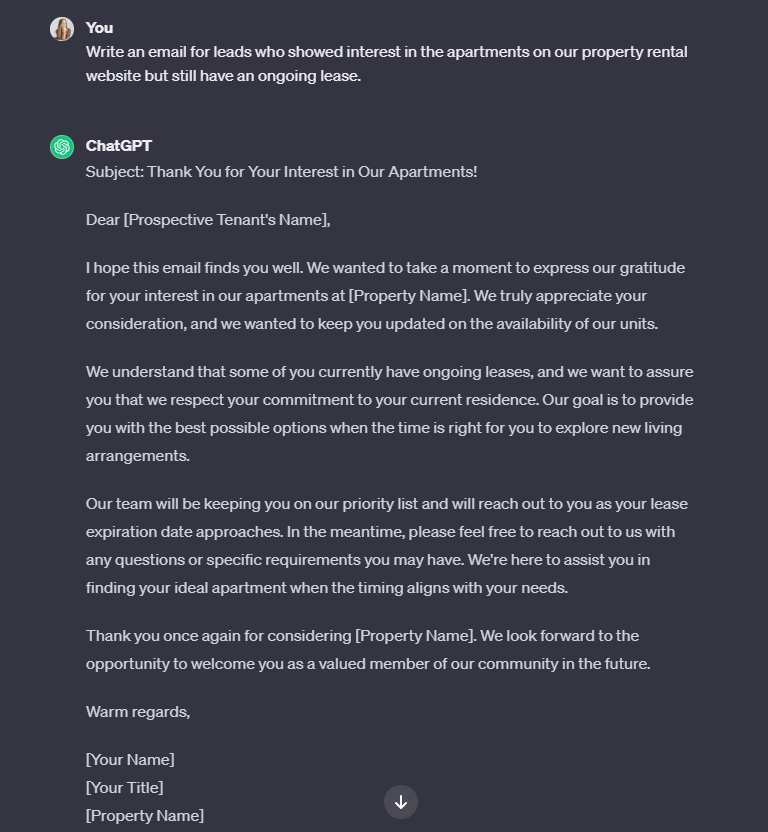
4. Take Social Media Marketing Up a Notch
Social media has become instrumental in today’s digital-savvy real estate industry – providing virtual tours, updates on market trends, and even answering FAQs from prospective clients.
With ChatGPT, real estate agents have found an effective way to manage their online presence and create engaging short-form content. AI can generate responses to user comments, craft catchy social media posts, and even strategize marketing campaigns – so you stay top-of-mind with potential clients.
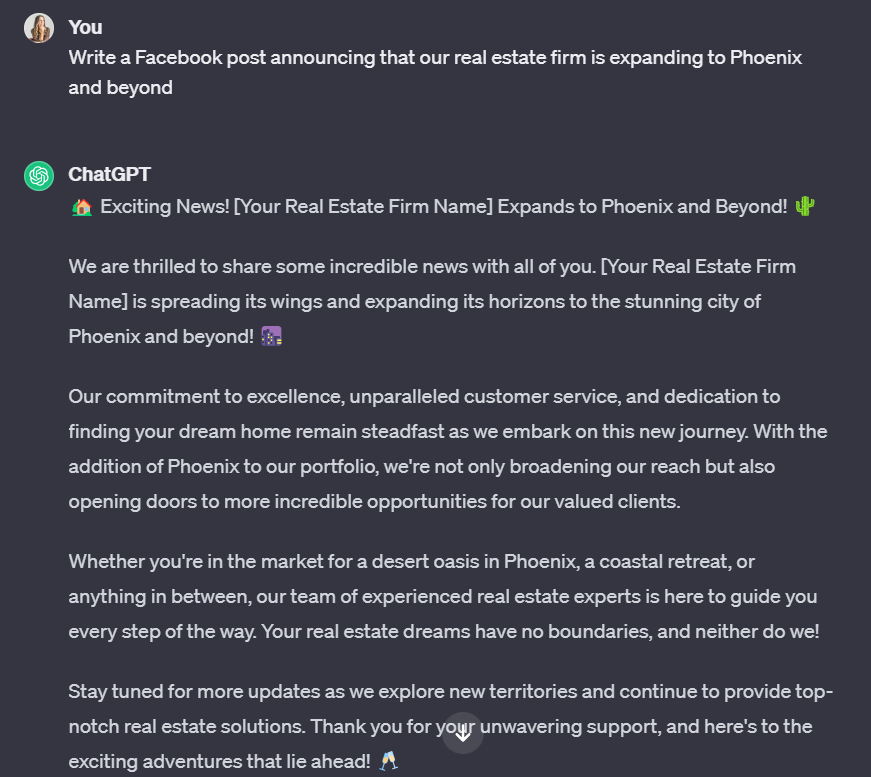
5. Enhance Virtual Property Videos
You’ve heard about how ChatGPT can revolutionize real estate property listings. Did you know that ChatGPT is also transforming the way real estate videos are created?
First, let’s talk about virtual tours. Real estate agents are increasingly utilizing virtual tours to offer prospective buyers an immersive experience. But, crafting engaging scripts for these tours can be time-consuming.
This is where ChatGPT steps in. It can generate captivating narratives based on your property details, transforming dry specs into compelling stories that highlight key features and local market trends.
Beyond virtual tours, think of other video formats used in successful real estate marketing campaigns — market updates, advice segments, agent introductions … the list goes on.
No matter the format or purpose of your videos though; personalized scripting remains crucial. And guess what? With clear instructions provided to it by us humans, ChatGPT becomes a versatile scriptwriting partner.
Natural language processing (NLP) forms the backbone of ChatGPT’s prowess – enabling it to understand human language nuances and generate responses accordingly. It’s not just about replacing human effort, but rather about helping real estate professionals work smarter by leveraging AI to their advantage.
So whether you’re a real estate agent wanting to up your content game or an agency looking for efficient ways to scale video production — utilizing ChatGPT can be a strategic move that pays off big time.
6. Enhance Customer Support
If you’re in the real estate business, you know that customer support is vital. But it’s also time-consuming and can sometimes feel like a game of catch-up.
This is where ChatGPT shines. AI can provide personalized replies to queries, enhancing your customer service efforts significantly.
Imagine a client asking about property listings or market trends on your website at midnight. Instead of waiting for office hours for an agent’s reply, they get an immediate response from ChatGPT.
The AI model uses NLP to understand the question and generate comprehensive answers based on sales data and local market knowledge. This leads to quick yet thorough responses no matter when clients ask their questions.
I asked ChatGPT to address a customer complaint and here’s how it responded.
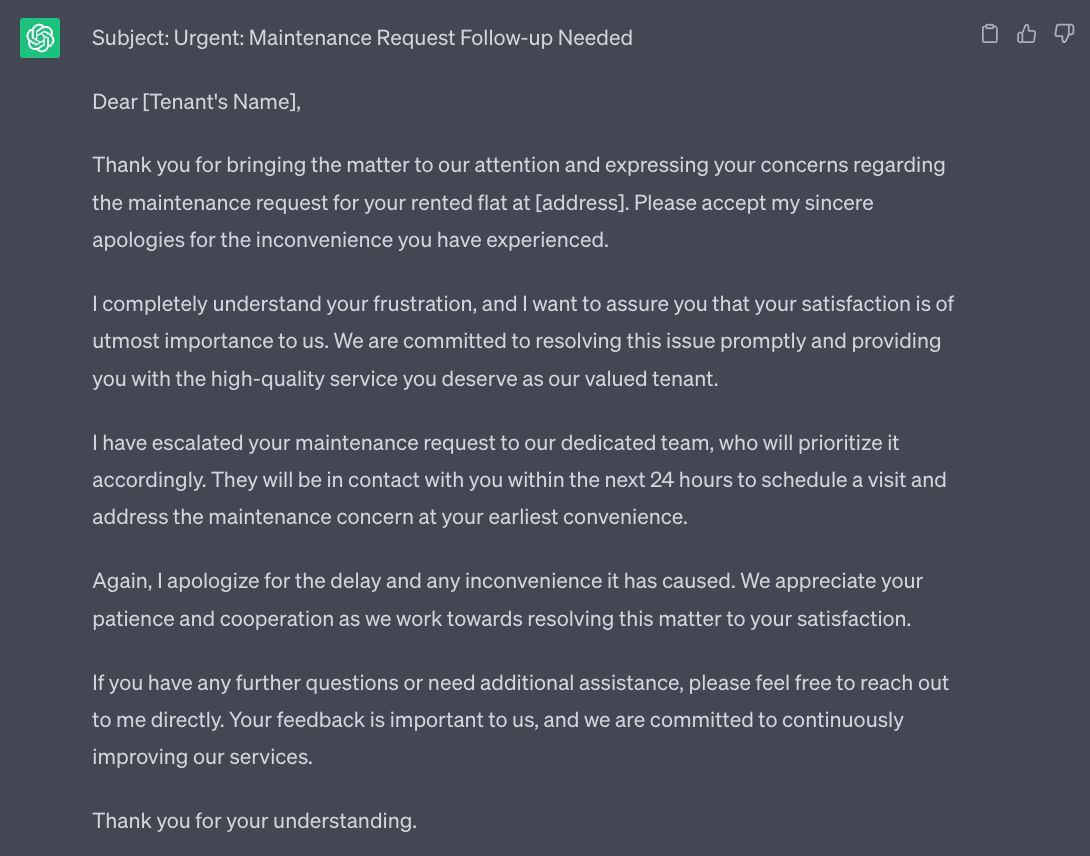
Apart from responding quickly to individual queries, one key feature of this powerful AI chatbot is its ability to generate sets of frequently asked questions (FAQs).
Rather than having agents spend valuable time crafting FAQs manually, why not let artificial intelligence do the heavy lifting? You’ll be surprised how much time this saves while ensuring accuracy across all generated content.
Not only does ChatGPT save time, but it also ensures high-quality responses. When using ChatGPT as part of your online presence strategy, there’s less need for follow-ups because initial responses are so detailed thanks to its deep learning capabilities.
7. Draft Legal Documents
Imagine a world where drafting legal documents is no longer tedious and time-consuming. This is the reality with ChatGPT for real estate. AI is revolutionizing how we write contracts, tenancy agreements, and other crucial paperwork.
Think of it as having a skilled assistant who can write comprehensive and accurate property details into your lease agreement. With ChatGPT at your side, you get to automate routine tasks that traditionally take up valuable time.
Say goodbye to long hours spent writing out complex legal terms or repetitive clauses in contracts. Instead, ChatGPT prompts generate these documents accurately.
Here’s an example of a lease agreement I asked ChatGPT to write:
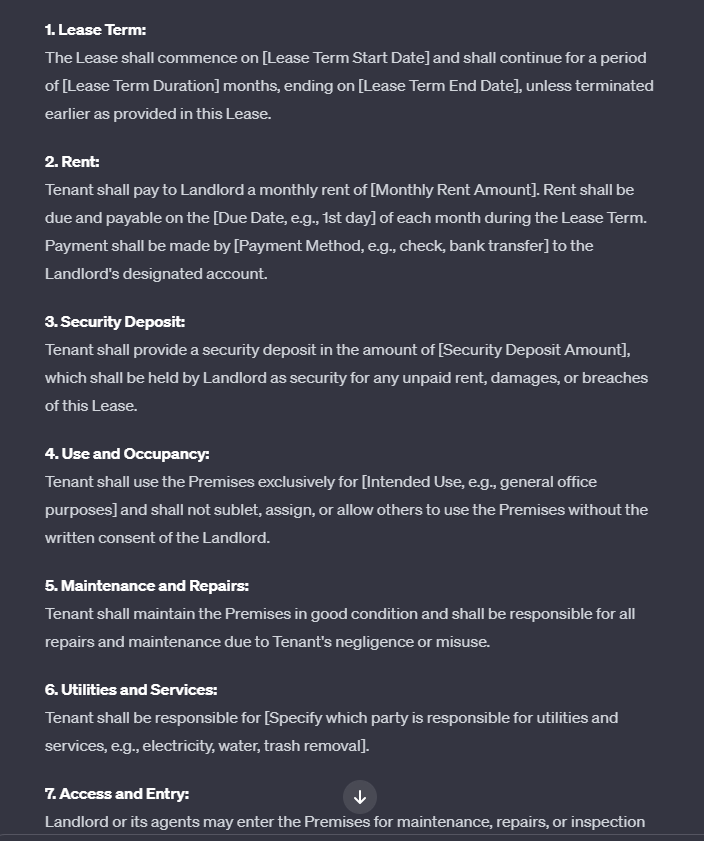
8. Summarize and Translate Documents
Real estate professionals often spend a significant amount of time going through lengthy documents such as property descriptions, sales data, or market trend reports. ChatGPT can help by condensing these documents into concise summaries without losing important details, allowing agents to work faster.
In today’s globalized world, language barriers should never hinder business communications. ChatGPT offers a solution by quickly translating emails or documents from one language to another.
Here I asked ChatGPT to translate our earlier email into Spanish:
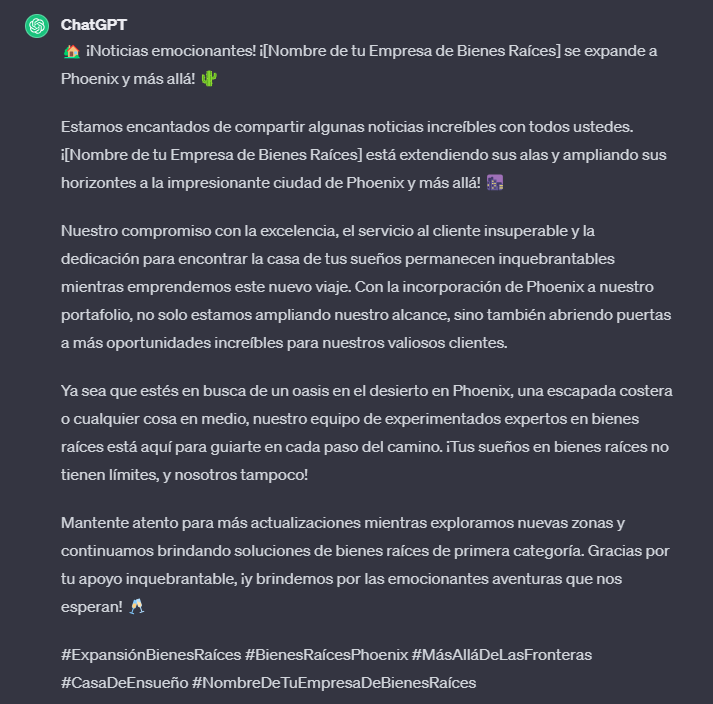
Do note that for legal documents, human translators should always go through ChatGPT’s output to ensure accuracy.
While ChatGPT offers impressive capabilities, it’s not as perfect or nuanced as human language. Therefore, it is essential to fine-tune the response of ChatGPT for document summarization or translation.
Do’s & Dont’s of ChatGPT for Real Estate
When using ChatGPT for a real estate business, it’s important to be aware of certain do’s and don’ts.
Dos:
- Provide Accurate Information: Ensure that the information provided by ChatGPT about properties, pricing, and other details is accurate and up-to-date.
- Engage Users Promptly: Respond promptly to user inquiries to maintain engagement and provide a positive user experience.
- Personalize Responses: Tailor responses to individual users by incorporating their preferences and requirements and offering personalized recommendations.
- Guide Users Through Processes: Use ChatGPT to guide users through processes such as scheduling property viewings, submitting rental applications, or signing contracts.
- Maintain Professionalism: Maintain a professional tone in all interactions, even in casual or informal conversations, to uphold the reputation of your real estate business.
- Educate Users: Use ChatGPT to educate users about the real estate market, property buying or renting processes, and any relevant legal or financial considerations.
Don’ts:
- Misrepresent Properties: Avoid misrepresenting properties or providing misleading information that could lead to misunderstandings or legal issues.
- Overpromise: Avoid overpromising or making unrealistic claims about properties or services offered by your real estate business.
- Ignore User Preferences: Don’t ignore user preferences or requirements when providing recommendations or information about properties.
- Use Inappropriate Language: Avoid using inappropriate or offensive language in interactions with users, as this can damage your real estate business’s reputation and alienate potential clients.
- Use ChatGPT to Write Entire Blog Posts. Using ChatGPT for blog writing has potential drawbacks in terms of quality, accuracy, and legal compliance. The output may also sound generic and fail to reflect your unique brand voice. ChatGPT is great for finding inspiration for your content, but when it comes to actual writing, a specialized content marketing platform like BrandWell is a more reliable option.
- Input sensitive information. Due to privacy concerns, do not enter real contact details and customer data into ChatGPT. Remember, any data you input could be used for AI training and become publicly accessible. Instead, provide ChatGPT with contextual scenarios, asking it to assume specific roles or personas within the real estate field.
- Rely solely on ChatGPT without human oversight: While ChatGPT can be a valuable tool, don’t rely solely on it for critical tasks such as negotiating contracts or resolving disputes. Always involve human oversight when necessary.
An experiment conducted by Sarah Bell, an AI specialist focused on real estate, revealed some inherent biases in how ChatGPT processes information which could have serious implications if unchecked. In her experiment, Bell asked the bot to produce a Python code for evaluating tenants’ desirability based on nationality. The results were shockingly biased against Australians without any logical explanation.
This highlights the need for human oversight whenever you are using ChatGPT or any other AI tool. To prevent such biases and errors, it’s vital to review and validate ChatGPT’s outputs, ensuring they align with ethical standards and factual accuracy in the real estate domain.
As real estate professionals, it’s essential to understand these do’s and don’ts when using AI in your real estate business. It can be an incredibly powerful tool but also potentially harmful if misused or misunderstood.
Can AI Take Over Real Estate?
While AI can certainly play a significant role in various aspects of the real estate industry, it’s unlikely to completely take over the entire sector. Here are several reasons why:
Complexity of Transactions: Real estate transactions often involve complex legal, financial, and emotional considerations that may require human judgment and negotiation skills. While AI can assist in certain tasks such as market analysis or lead generation, it may not be able to handle the intricacies of every transaction.
Human Relationships: Real estate transactions often involve building trust and rapport with clients. Many people prefer working with human agents who can understand their needs, provide personalized advice, and guide them through the process.
Unpredictable Market Factors: Real estate markets are influenced by various economic, social, and environmental factors that can be challenging to predict accurately. While AI can analyze data and identify trends, it may struggle to account for unexpected events or changes in market dynamics.
Legal and Ethical Considerations: Real estate transactions are subject to numerous legal and ethical considerations that require human oversight. AI may not always be able to navigate these complexities or ensure compliance with regulations.
Emotional Considerations: Buying or selling a home can be an emotional process involving nostalgia, attachment, or excitement. Human agents can provide empathy and emotional support that AI may lack.
Local Knowledge and Expertise: Real estate markets vary significantly from one location to another, and local knowledge and expertise are often crucial for success. Human agents who are familiar with the local market can provide valuable insights and guidance to clients.
While AI can automate certain tasks, enhance efficiency, and provide valuable insights, it is unlikely to completely replace human real estate agents. Instead, the most successful applications of AI in real estate are likely to involve collaboration between AI systems and human professionals, leveraging the strengths of both to deliver the best possible service to clients.
The Future is Here: Embrace AI in Real Estate
While AI tools like ChatGPT are not meant to replace human real estate agents entirely, they can certainly lighten their workload. They allow professionals to focus more on closing deals rather than getting bogged down with content creation.
From drafting a lease agreement to writing compelling listing descriptions, ChatGPT is transforming the landscape of real estate. Its capabilities extend beyond just creating effective content but also help agents work smarter by handling tasks that would otherwise consume valuable time.
Not only does AI make your job easier, but it also boosts efficiency. This leaves you with more opportunity to focus on what truly matters — building relationships with your clients.
FAQs – ChatGPT for Real Estate
How can ChatGPT be used for real estate?
ChatGPT helps with property descriptions, email campaigns, legal documents, and social media content. It also boosts customer support by providing personalized responses.
Can I use AI for real estate?
Absolutely. You can use AI like ChatGPT to automate tasks such as marketing campaigns, document summarization, translation services, or even writing scripts for virtual tours.
How do I use ChatGPT for listing descriptions?
You input basic info about a property into ChatGPT and it’ll spit out engaging listings that appeal to diverse audiences.
Conclusion
By now, you’ve seen the power of ChatGPT for real estate. It’s like having an extra hand on deck that never gets tired.
Thanks to AI, you can now post engaging property descriptions and run email campaigns on autopilot.
Imagine saving all those hours!
This AI assistant doesn’t stop there. It provides personalized replies to customer queries, making support a breeze.
Remember when we talked about legal documents? ChatGPT has got you covered but always double-check with a professional.
Here’s the good news: if you’re already subscribed to BrandWell for blog writing, you don’t need ChatGPT anymore.
BrandWell recently introduced its very own chatbot called AIMEE which runs on the same GPT-4 engine but is trained specifically on marketing copy.
With a long-form AI SEO writer working alongside AIMEE and 40+ AI Agents, your entire content marketing process can now run on autopilot — allowing you to focus on what you do best: selling property.